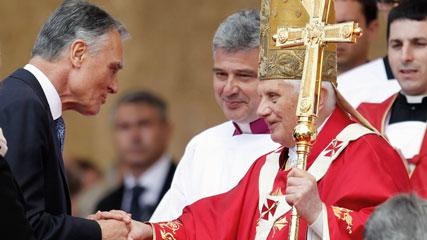By Lauren Frayer
Aol News
June 16, 2010
http://www.aolnews.com/world/article/popes-trip-highlights-changing-face-of-europes-catholics/19477924
LISBON, Portugal (May 15) -- Looking at the throngs of faithful following Pope Benedict XVI around Portugal this past week, you might mistake this tiny European country for one in South America or Africa.
With more brown faces in the crowd than white ones, the Catholic Church is increasingly drawing its support here from immigrants to Portugal rather than from native Europeans. And as secularism sweeps Europe, immigrants may be the Vatican's best hope for hanging on to formerly traditional Catholic countries where its once overwhelming power is now waning.
In the 16th century, Portuguese explorers spread Catholicism to Africa, Asia and South America -- feats for which Benedict applauded the country in a sermon this week in Lisbon.
 |
"Portugal has gained a glorious place among the nations for service rendered to the spreading of the faith: in all five continents there are local churches that owe their origin to the Portuguese missionary activity," Benedict said.
But while Europe is where Catholicism first spread from, it's also where it's dying out fastest. Longtime Vatican strongholds like Portugal -- founded in the 12th century by Crusaders who liberated Lisbon from the Moors on their way to Jerusalem -- are doing things like legalizing gay marriage and abortion, much to the chagrin of the Catholic Church.
Even the Vatican press office this week begrudgingly called Lisbon a "secularized city."
That might explain why Benedict traveled all the way to Angola, a former Portuguese colony in southwest Africa, well before he came to Portugal. In Angola, the pope's campaign against condom use – which critics blame for exacerbating a soaring AIDS epidemic there -- has gained traction in a way no desire of the Church ever could these days in Europe. Two million Angolans turned out to see Benedict at a stadium near the capital Luanda in March 2009, and two women were trampled in the excited crowd.
In Portugal this week, the pope's handlers were careful to book smaller venues, seeking to avoid images of empty seats. Still, hundreds of thousands attended the main event, an open-air mass in Fatima, a shrine town built on the spot where shepherd children reported speaking with a vision of the Virgin Mary 93 years ago.
"For believers, his visit is a message of hope, that the pope still recognizes Portugal, but I don't think it'll change people," said Rita Neves, a 23-year-old security volunteer at the pope's Lisbon mass on Tuesday. "We're becoming more European.... I don't know if the pope believes that he's losing Portugal, but the fact is he is losing our country."
Catholic doctrine was once integrated into government policy, especially under the military dictatorship that ruled Portugal through the mid-1970s. Replaced by neutral institutions like civil marriage and secular schools and hospitals, the faith's keepers are literally dying out.
The average age of priests in Portugal is 62, and six out of the country's 20 bishops will reach the age of 75 in the next year and a half, according to Peter Stilwell, dean of the theology faculty at the Catholic University of Portugal.
Even compared to other Catholic countries in Europe, Portugal's churchgoers are waning.
"You can actually breathe and walk around in this crowd. People aren't packed into the streets like back home," said Antonina Jankowiak, 22, a Polish exchange student who lined up to see the pope in Lisbon. "People are coming and going, but in Poland it would be jammed and you would stay there (in the pope's audience) for hours."
"In Lisbon I feel like the churches are always closed, or they're not full of people," said another exchange student, 20-year-old Katarzyna Nowak, from Krakow. "I went on Easter and there wasn't even any holy water."
While the Vatican says 90 percent of Portuguese identify themselves as Catholic, it acknowledges that barely 20 percent actually go to church. Abortion was legalized in 2007. A gay marriage bill sailed through the country's parliament in February, and is awaiting the president's signature to become law.
But Benedict's trip to Portugal this past week shows the Vatican hasn't yet given up on countries where its ideology once held more sway. In fact, the pope may be trying to re-invigorate it.
"Portugal is changing rapidly. From a small rural-based economy with huge African colonies it has become an urban-based society... It is only natural that the way the Portuguese live their faith should be under pressure to change," Stilwell said. "We have all the ingredients for a rapid alteration of the religious landscape. I presume the Vatican sees this."
For some, that was the whole point of choosing the German-born Benedict as pope five years ago, rather than a candidate from the developing world. His papacy may represent a last-ditch effort to shore up Christianity in Europe against a tide of secularism.
If that's the case, the 83-year-old pontiff will have his work cut out for him. At the end of this summer he visits Britain, where a 2008 Gallup poll found that 71 percent of respondents said religion doesn't occupy an important place in their lives. The figure for Portugal was 27 percent.
"The presence of secularism is something normal, but the separation and opposition between secularism and faith... must be transcended," Benedict told reporters en route to Portugal last week. He called the conflict between secular and religious life "the greatest challenge of the present moment" and "Europe's mission."
There are some numbers, though, in which the pope can still take heart. Portugal's 10 million people are fast becoming more secular, but the country left a legacy of great importance for the Vatican: Brazil, a former Portuguese colony with nearly 200 million people, is now the world's largest Catholic nation.
Any original material on these pages is copyright © BishopAccountability.org 2004. Reproduce freely with attribution.